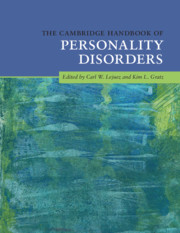Book contents
- The Cambridge Handbook of Personality Disorders
- The Cambridge Handbook of Personality Disorders
- Copyright page
- Contents
- Figures
- Tables
- Contributors
- Preface
- Part I Etiology
- Part II Models
- Part III Individual Disorders and Clusters
- 9 Cluster A Personality Disorders
- 9a Conceptual and Methodological Reflections on Schizotypy, Schizotypic Psychopathology, Cluster A Disorders, and Schizophrenia: Commentary on Cluster A Personality Disorders
- 9b Improved Operationalization and Measurement Are Central to the Future of Cluster A Personality Disorders: Commentary on Cluster A Personality Disorders
- 9c Cluster A Heterogeneity: Author Rejoinder to Commentaries on Cluster A Personality Disorders
- 10 Borderline Personality Disorder
- 10a Further Reflections on Assessment, Etiology, and Treatment: Commentary on Borderline Personality Disorder
- 10b Integrating Neuroscience and Psychotherapy: Commentary on Borderline Personality Disorder
- 10c The Promise of Applying a Developmental Psychopathology Framework to the Etiology and Treatment of Borderline Personality Disorder: Author Rejoinder to Commentaries on Borderline Personality Disorder
- 11 An Integrative Biobehavioral Trait Perspective on Antisocial Personality Disorder and Psychopathy
- 11a What Do We Talk about When We Talk about Psychopathy? Commentary on an Integrative Biobehavioral Trait Perspective on Antisocial Personality Disorder and Psychopathy
- 11b Issues of Emphasis in the Triarchic Psychopathy Model: Commentary on an Integrative Biobehavioral Trait Perspective on Antisocial Personality Disorder and Psychopathy
- 11c An Agreeable Response to Questions and Criticisms: Author Rejoinder to Commentaries on an Integrative Biobehavioral Trait Perspective on Antisocial Personality Disorder and Psychopathy
- 12 Narcissistic and Histrionic Personality Disorders
- 12a A Call for Scientific Caution: Commentary on Narcissistic and Histrionic Personality Disorders
- 12b Beyond Nucleus Diagnostic Conceptualizations: Commentary on Narcissistic and Histrionic Personality Disorders
- 12c Clinical Personality Science of Narcissism Should Include the Clinic: Author Rejoinder to Commentaries on Narcissistic and Histrionic Personality Disorders
- 13 Cluster C Anxious-Fearful Personality Pathology and Avoidance
- 13a Epidemiological, Factor-Analytic, and Cognitive Factors in the Position of Obsessive-Compulsive Personality Disorder among the Cluster C Personality Disorders: Commentary on Cluster C Anxious-Fearful Personality Pathology and Avoidance
- 13b Examining Cluster C Personality Pathology Using an Interpersonal Lens: Commentary on Cluster C Anxious-Fearful Personality Pathology and Avoidance
- 13c Processes, Mechanisms, and Progress: Author Rejoinder to Commentaries on Cluster C Anxious-Fearful Personality Pathology and Avoidance
- Part IV Assessment
- Part V Treatment
- Index
- References
9c - Cluster A Heterogeneity: Author Rejoinder to Commentaries on Cluster A Personality Disorders
from Part III - Individual Disorders and Clusters
Published online by Cambridge University Press: 24 February 2020
- The Cambridge Handbook of Personality Disorders
- The Cambridge Handbook of Personality Disorders
- Copyright page
- Contents
- Figures
- Tables
- Contributors
- Preface
- Part I Etiology
- Part II Models
- Part III Individual Disorders and Clusters
- 9 Cluster A Personality Disorders
- 9a Conceptual and Methodological Reflections on Schizotypy, Schizotypic Psychopathology, Cluster A Disorders, and Schizophrenia: Commentary on Cluster A Personality Disorders
- 9b Improved Operationalization and Measurement Are Central to the Future of Cluster A Personality Disorders: Commentary on Cluster A Personality Disorders
- 9c Cluster A Heterogeneity: Author Rejoinder to Commentaries on Cluster A Personality Disorders
- 10 Borderline Personality Disorder
- 10a Further Reflections on Assessment, Etiology, and Treatment: Commentary on Borderline Personality Disorder
- 10b Integrating Neuroscience and Psychotherapy: Commentary on Borderline Personality Disorder
- 10c The Promise of Applying a Developmental Psychopathology Framework to the Etiology and Treatment of Borderline Personality Disorder: Author Rejoinder to Commentaries on Borderline Personality Disorder
- 11 An Integrative Biobehavioral Trait Perspective on Antisocial Personality Disorder and Psychopathy
- 11a What Do We Talk about When We Talk about Psychopathy? Commentary on an Integrative Biobehavioral Trait Perspective on Antisocial Personality Disorder and Psychopathy
- 11b Issues of Emphasis in the Triarchic Psychopathy Model: Commentary on an Integrative Biobehavioral Trait Perspective on Antisocial Personality Disorder and Psychopathy
- 11c An Agreeable Response to Questions and Criticisms: Author Rejoinder to Commentaries on an Integrative Biobehavioral Trait Perspective on Antisocial Personality Disorder and Psychopathy
- 12 Narcissistic and Histrionic Personality Disorders
- 12a A Call for Scientific Caution: Commentary on Narcissistic and Histrionic Personality Disorders
- 12b Beyond Nucleus Diagnostic Conceptualizations: Commentary on Narcissistic and Histrionic Personality Disorders
- 12c Clinical Personality Science of Narcissism Should Include the Clinic: Author Rejoinder to Commentaries on Narcissistic and Histrionic Personality Disorders
- 13 Cluster C Anxious-Fearful Personality Pathology and Avoidance
- 13a Epidemiological, Factor-Analytic, and Cognitive Factors in the Position of Obsessive-Compulsive Personality Disorder among the Cluster C Personality Disorders: Commentary on Cluster C Anxious-Fearful Personality Pathology and Avoidance
- 13b Examining Cluster C Personality Pathology Using an Interpersonal Lens: Commentary on Cluster C Anxious-Fearful Personality Pathology and Avoidance
- 13c Processes, Mechanisms, and Progress: Author Rejoinder to Commentaries on Cluster C Anxious-Fearful Personality Pathology and Avoidance
- Part IV Assessment
- Part V Treatment
- Index
- References
Summary
In their commentaries, Lenzenweger (this volume) and Le and Cohen (this volume) have added important complementary perspectives to understanding and conceptualizing Cluster A disorders.Lenzenweger discusses Cluster A disorders in the context of previous theory and research on schizotypy and schizophrenia, for instance discussing how schizotypy is a distinct construct from Schizotypal Personality Disorder. Le and Cohen focus on situating Cluster A symptomatology in the context of efforts to move beyond traditional DSM categorical personality disorders as well as efforts to develop alternative assessment methods. These are both valuable complementary perspectives to the chapter that was focused primarily on research specifically on DSM Cluster A personality disorder categories.
- Type
- Chapter
- Information
- The Cambridge Handbook of Personality Disorders , pp. 221 - 222Publisher: Cambridge University PressPrint publication year: 2020

